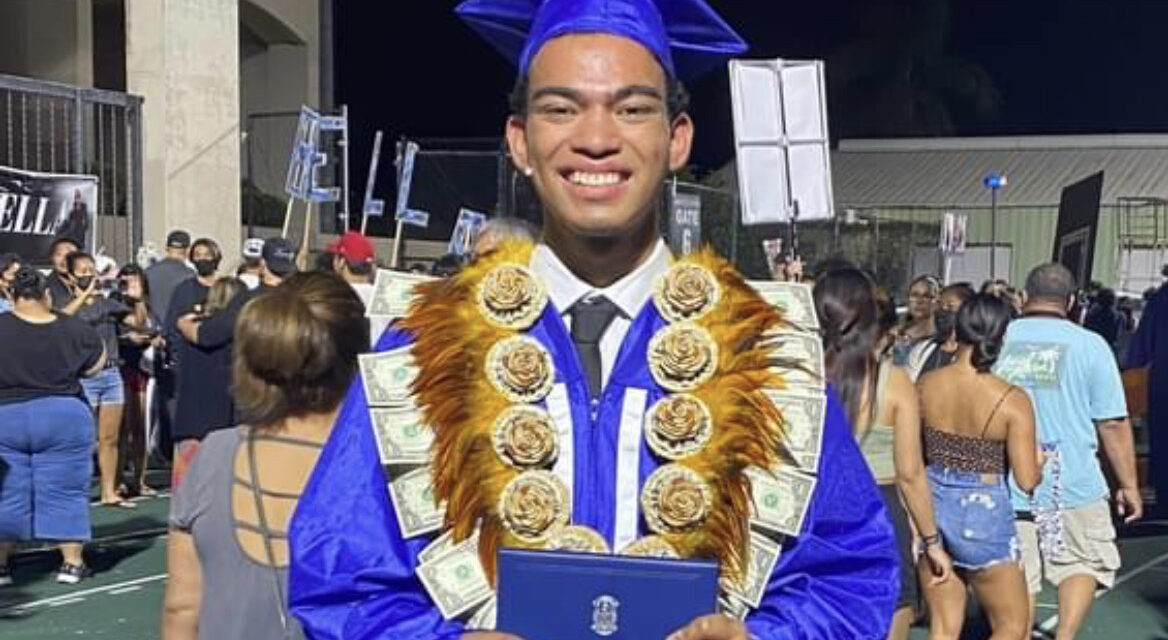Micah Tutuvanu graduated from Moanalua High School and enrolled at KCC as a first-generation student. (Photo by Micah Tutuvanu)
By Micah Tutuvanu | Staff Writer
The challenges that first-generation students face are hard. They’re told to navigate the college experience by themselves—often receiving little to no help from others.
When I first entered college, I was clueless as to what to do. I didn’t have a sense of awareness about the college experience and I did not know who to talk to. As I look back at my experiences in college, I think about the rights and wrongs of my actions. If you question yourself asking “Where do I start off?” I am here to help you. I am a first-generation student who has done a lot of learning in my first semester (plus a few summer classes) at KCC. Here are a few tips for all of you first-generation students struggling to navigate the college experience.
1. Meet with your counselor
A lot of people might stray away from meeting with their counselor. It might be a fear of your counselor not knowing you or maybe you’re opposed to doing so because you deem it “useless.” Meeting with your counselor at your institution is a must. Whether it be your academic advising counselor or your major-specific counselor, It’s good to build a foundation of support with people who are knowledgeable in the college experience and to get notified on opportunities that might benefit you in the near future. Especially as a first-generation student, some of the opportunities you might get can change your whole college experience for the better.
You can find out who your counselor is through your school’s website. For Kapi’olani Community College, the counselors are major specific that range from culinary to sciences. Email your major-specific counselor about any questions pertaining to academics or class schedules. Get into contact with them because they’ll be a great resource.
2. Apply! Apply! Apply!
Apply in what? I could be talking about applying yourself more in your academics, applying for scholarships, or even applying yourself more in extracurriculars. This is what I refer to as the three A’s, and it’s how I get by in my college life as a first-generation student. Apply yourself in your academics to succeed and achieve the desired grades you want. As long as you try your best and make an attempt, know that you’re doing well.
Financial insecurity is the harsh reality for many college students and many first-generation students too. Apply for as many scholarships as you can to avoid the debt later. Scholarships can be found via a Google search or through your counselors. There are many scholarships out there for everyone.
One scholarship to note is the UH System General Scholarship. The deadline for this scholarship is March 1, and anyone in the UH system can apply. There are specific scholarships for certain people/ethnic groups too. Scholarships such as the Native Hawaiian Kamehameha Schools scholarship due Jan. 6 or the LGBTQ+ community Pride Foundation scholarship due Jan. 6.
Apply yourself more to extracurriculars; it’ll offer a vast amount of opportunities. This can include internships, leadership positions or anything you’re able to build your résumé.
3. Don’t be discouraged.
At one point, I didn’t think college was right for me. I remember my high school teacher pulled me aside once and told me I wouldn’t be a good fit for college. Instead of moping around and believing what I was told, I used that as motivation. If someone doubts you or doesn’t believe you can pursue an educational path, never believe them. Their thoughts do not dictate what you’re capable of doing. The fact that you’re in college and making an effort to receive a higher education proves that you’re smart enough and motivated enough to do anything as long as you put your mind to it. Never give up, especially when others try to discourage you and bring you down.
4. Advocate!
It’s important to advocate for yourself. Opportunities are there, but it is important on your end to reach out to others. There is always someone on campus who knows the answer to your question. Someone willing to assist you. Keep in mind that staff and faculty on college campuses are very busy. Do not wait for someone to reach out to you; instead reach out to them. During the summer, I knew I wanted to join Student Congress. Instead of waiting for someone to contact me about this opportunity, I reached out to them. I researched Student Congress on the KCC website and emailed the SC advisor Romyn Sabatchi. Now I am the Public Relations officer of Student Congress and I love every minute of it.
How can you reach out to them? Email is best, but if they do not respond to emails, then drop by their office. Introduce yourself, and discuss with them what you need to discuss. If you need anything, you have to reach out to others. It might get uncomfortable at first, but it’s a part of human life. It does not hurt to try. Email professors and staff about scholarships, internships, educational opportunities and anything in that nature.
5. Don’t overload yourself with too much.
It’s okay to know your limit. Never do too much at the cost of your mental well-being. A lot of college students make the mistake of underestimating the amount of work they’ll get from classes. If you add on extracurricular activities, that’s another commitment. It’s good to be proficient and achieve the best grades possible. It’s also good to make time for yourself and know when enough is enough. Only you know your limit, don’t over work it.
I struggle with this because I am very work-oriented in the sense that I take any opportunities that come my way. First-generation college students do not know about the rigor of college. It’s a rigorous experience with a lot of opportunities that come along the way. Consider the amount of time you have right now. If you struggle with juggling your school work, and your extracurricular activities, then do not apply. It’ll be another commitment added to your plate.
Being a first-generation college student is difficult. I questioned how am I able to go through college without family members or close friends who know about the college experience. A lot of people might think of it as a curse, but over time, I learned that it’s a blessing. You’re making history in your own family by breaking the norms of education and making a difference in your family. As you go forth on your journey, know that it won’t be easy because some days you’ll be pushed past your limits and you’ll want to give up.
Just remember why you are doing this. Believe in yourself. Never give up, and always strive for the highest.
If you have any further questions or want to further discuss tips and advice about being a first-generation college student, please feel free to contact me at mtutu@hawaii.edu. Let’s set up a day to talk.






